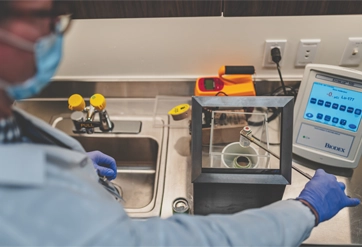
Radiopharmaceutical therapy (RPT) is a type of personalized medicine that can improve treatment outcomes for patients with certain cancers. While RPT has limited indications currently, its potential applications across many cancer types have spawned growing interest in this modality. Continued investment in research and development in RPT has the potential to yield novel applications as single agents or combined with other drugs, ushering in a new era of tailored and effective cancer therapy. Radiation oncologists with expertise in oncology, radiobiology and physics are well-equipped to provide these treatments to appropriate patients and lead the path forward for this treatment modality. ASTRO has been actively developing resources for RPT for several years and continues to advocate for radiation oncology in many ways.
RPT CommitteeIn 2018, an RPT working group was established to develop resources for ASTRO membership. In 2024, ASTRO formalized an RPT Committee from this long-standing working group. The group consists of radiation oncologists and medical physicists actively treating cancer with RPT in their own practices who are interested in fostering collaboration and accelerating progress in this dynamic field. Both the committee and original working group aimed to pool expertise and drive advancements in the development, optimization and clinical implementation of RPTs in radiation oncology practice and maximize opportunities for multidisciplinary collaboration.
Radiopharmaceutical Therapy RoundtableIn early 2023, ASTRO convened RPT industry leaders and ASTRO members, including academic and community practice physicians, physician scientists, and physicists for a strategic dialogue on the future of RPT. The meeting yielded key insights and priority areas to drive ASTRO’s activities, including the development of a Radiopharmaceutical Roundtable, allowing industry to cooperate on the strategic direction of ASTRO RPT activities.
The first official RPT Roundtable meeting was held in early 2024. Representatives from eight corporate RPT Roundtable members joined two dozen physicians and physicists from both academic and community practices. More information can be found here. The second roundtable was held on November 12, with 52 attendees, including 31 industry representatives from 16 companies. Discussion included the need to expand the number of authorized users for RPT, enhance engagement and training for the entire radiation oncology team, and foster collaboration with other involved specialties, such as nuclear medicine and referring physicians.
PublicationsASTRO publishes on various RPT topics to advance the understanding and application of therapy and promote multidisciplinary collaboration. These resources are intended for a wide audience including resident trainees, established clinicians and researchers. The dissemination of such information contributes to the collective knowledge base, fostering collaboration and encouraging further advancements in the realm of RPT, ultimately benefiting patients and shaping the future of radiation oncology.
- A Framework for Patient-Centered Pathways of Care for Radiopharmaceutical Therapy: An ASTRO Consensus Document
- Framework for Radiopharmaceutical Therapy Curriculum Development for Trainees
- RPT-themed ASTROnews issue
- Information on how to become an authorized user for RPT
- Coming soon: ASTRO’s Safety White Paper for Radiopharmaceutical Therapy
Education
In 2024, ASTRO offered a nine-part Curriculum Series: Beyond the Beam which provided comprehensive radiopharmaceutical therapy training within the context of existing radiation oncology training focusing on radiation biology, medical physics and clinical radiation oncology. The content was originally presented as a live webinar series, April 26 - July 5, 2024 and is now available in ASTROAcademy.
The RPT Masterclass, now called the Radiopharmaceutical Therapy Workshop, has been held each year at the ASTRO Annual Meeting since 2019 with over 500 attendees since its inception. The multi-year offering is a comprehensive educational initiative designed to provide an overview of RPT and cultivate expertise and leadership in the evolving landscape. Tailored for oncologists, physicists and nuclear medicine physicians, this session has provided an in-depth exploration of radiopharmaceutical science and applications. Experts and thought leaders in the field serve as speakers, offering valuable insights and guidance. This multi-year format ensures a sustained and progressive learning experience, enabling participants to stay abreast of the latest developments, foster innovation and contribute significantly to the advancement of RPT.
QualityStarting in 2024, ASTRO’s APEx – Accreditation Program for Excellence has a new RPT designation. APEx continues to be the fastest growing radiation oncology accreditation program in the United States, and the inclusion of RPT supports APEx remaining comprehensive and forward-focused. Practices can choose between pursuing RPT accreditation as a standalone offering or integrating it into a larger APEx accreditation. Both options provide practices specializing in RPT with the opportunity to be recognized for their expertise and dedication to quality care.
Patient resourcesASTRO has a series of patient-facing educational materials including treatment and disease-site specific brochures, videos, podcasts, etc. ASTRO is currently updating several of these resources to include RPT, where applicable.
AdvocacyThe Medicare program does not currently recognize RPTs as drugs, which means that the reimbursement paradigm in freestanding cancer centers is widely variable. ASTRO is advocating, alongside industry partners, for a reclassification of RPTs as drugs so that Medicare payment policy is uniform and stable.
The Future of Radiopharmaceuticals in Radiation OncologyAs RPT continues to grow and evolve, societal efforts will remain critical. With ongoing advancements, new agents and expanded uses, the potential of RPT to transform cancer treatment is substantial. ASTRO will continue to promote RPT in radiation oncology through advocating for regulatory approvals, increasing the number of authorized users, and creating resources to make sure radiation oncology is at the forefront of this transformation.
This article was originally published in the 2024 ASTRO Daily News and has been updated.

